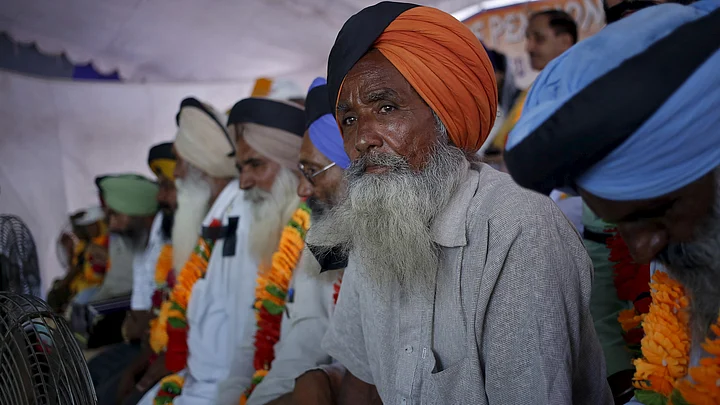The One Rank One Pension (OROP) dispute between ex-servicemen and the Government has disappeared from the front pages of newspapers. It does not find any mention on TV news channels also. However, it will be a gross fallacy to assume that the issue has been resolved. It has the potential of re-emerging in an even more virulent manner, with serious implications for peace, security and stability of the country.
OROP was the basis for determining pensions and benefits of defence personnel till 1973. It was summarily terminated that year by the Ministry of Defense (MOD) in an “ex-parte” decision.
Abrogation of OROP, and decrease in pensions came as a rude shock and caused considerable angst amongst the services. Since 2008, it has led to repeated public appeals, protests and hunger strikes by ex-servicemen, a significant majority of whom retire before the age of forty.
Issues Remains Unresolved
It was sincerely hoped and expected that Prime Minister Modi will take necessary measures on assuming office. This did not happen. Ex-servicemen were forced to launch a nation-wide protest on 15 June. The sight of the ‘protectors of integrity’ of the country on protest shook the collective conscience of the nation. Regrettably even after seventeen months, the issue has not been resolved to the satisfaction of the aggrieved party.
After 83 days of protests, Raksha Mantri (RM) Parrikar announced on September 6 that notwithstanding the heavy burden that Government will have to bear on this account, it had accepted most of the demands. This did not satisfy the protesters as there was confusion on issues like benefits for personnel taking premature retirement. It was clarified by PM and RM that they would be included in the scheme. Ex-servicemen were also not satisfied that revision of pension would take place every five years instead of every year.
Trust Deficit
Those who had embarked on a fast-unto-death relented but it did not result in withdrawal of the protest. Ex-servicemen also demanded that government’s assurance be provided in writing. Last six weeks since RM’s announcement was made have not helped calm passions. Resentment has in fact been further exacerbated. Some leaders have launched pernicious attacks against some ministers. This is not conducive to progress on the issue.
Our defence services are held in the highest esteem by the nation. No other institution, be it the bureaucracy, police, media, politicians or judiciary comes anywhere close to the honesty and integrity of the armed forces. The Armed Forces have lived up to expectations in confronting natural and man-made disasters like floods, earthquakes, riots and communal clashes. It behooves upon us and particularly the government to do everything to uphold our faith in the services. The government depends upon and deploys the services of armed forces in times of need. If trust between the government and forces is shaken, the nation will be the big loser.
The image of both government and defence services has suffered because of the continuing agitation. Since the government has the power and authority, it should take all necessary steps to settle the issue quickly.
OROP Fiasco Should be Resolved
- Even after seventeen months, OROP issues stands unresolved
- The agitation has bruised the morale of defence services considerably which is not good for security of the country
- An inordinate delay does not reflect well upon the seriousness and sincerity of the bureaucracy
What the Government Should Do?
The government should stop behaving like an ‘’accountant’. It needs to take a long term political view of the issue. Spending a few thousand crores to satisfy the demands of agitating servicemen is infinitely more desirable than continuation of this unseemly dispute.
My conversation with a large cross-section of serving and retired defence personnel has revealed that they have little trust and faith in the bureaucracy. This is unfortunate. The situation needs to be rectified urgently. Here again onus is upon the government.
The morale of defence services is vitally important. The agitation has bruised it considerably. This is not good for the services or the government, and definitely not for security of the country.
For veterans to delve into the murky field of domestic politics by raising the Dadri issue brings no honour to them. In fact they will discredit their own cause if they divert their focus from the core issue of their movement and start commenting on extraneous, unrelated issues, just to embarrass the government.
OROP is not ‘’rocket science’’. The government should be able to arrive at an acceptable solution quickly. The inordinate delay does not reflect well upon the seriousness and sincerity of the bureaucracy. It is in government’s interest to settle the issue expeditiously and concentrate single-mindedly on other important issues of poverty, hunger, healthcare, education and security of the nation.
In finding a mutually acceptable solution, both sides need to show utmost restraint and behave with maturity and responsibility so that a conducive atmosphere is created to arrive at a balanced settlement. Both sides will improve their stature and respectability if they swiftly arrive at a just resolution of the issue.
(The writer is a former Indian ambassador to Kazakhstan, Sweden and Latvia.)
(At The Quint, we question everything. Play an active role in shaping our journalism by becoming a member today.)
